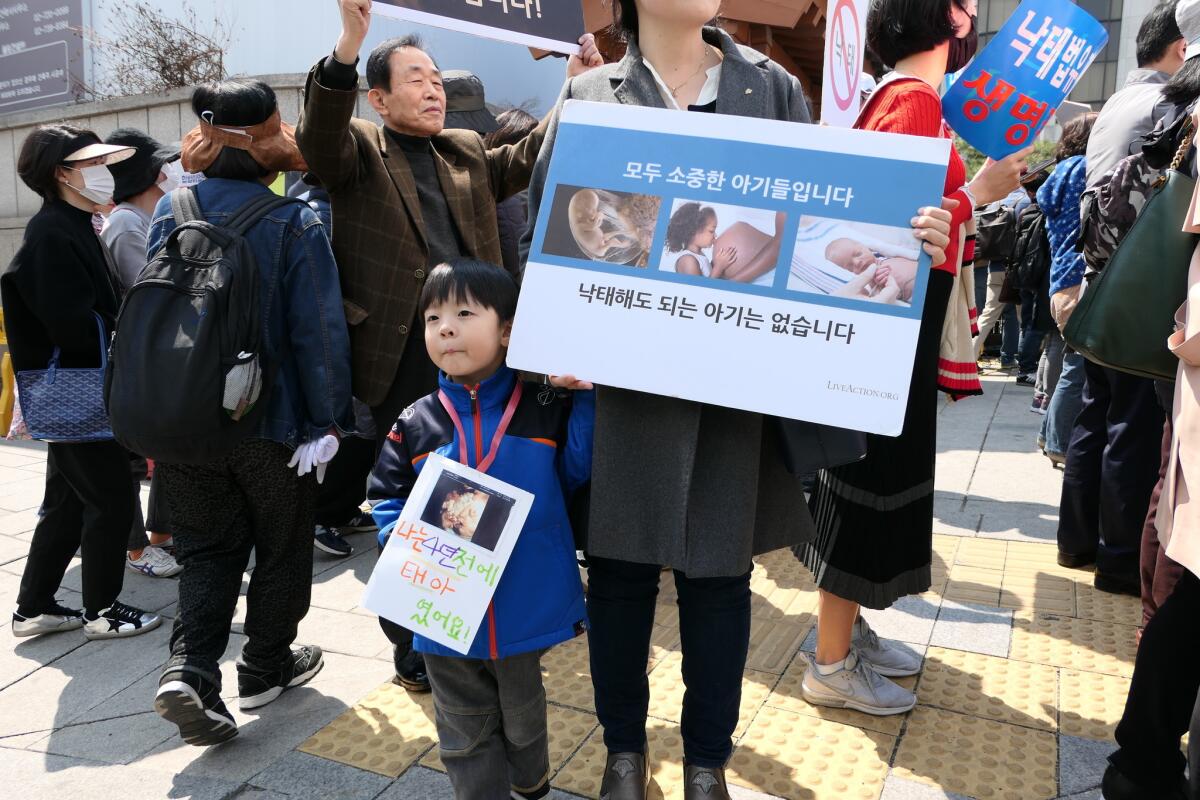South Korea abortion ban is unconstitutional, top court rules

- Share via
Reporting from Seoul — South Korea’s Constitutional Court ruled Thursday that the country’s 65-year-old ban on abortion was unconstitutional, clearing the way for the practice to be legalized for the first time in the nation’s history.
The ruling will mean the end of long-standing but little enforced criminal laws under which abortion was punishable by up to a year in prison for women who undergo the procedure, and up to two years for medical providers. Seven of nine justices found the law inconsistent with the constitution, saying it “violates a pregnant woman’s right to self determination.”
The ruling was personal for many who showed up in front of the Constitutional Court ahead of the decision Thursday.
Sim Og-youn quietly stood on the sidelines as rival groups of protesters grew louder in their chants for and against the ban.
“Abortion is murder!” those on one side cried, some with young children in tow and carrying signs saying the kids had recently been fetuses themselves. “Guarantee reproductive rights,” those across the driveway demanded on a competing sound system.
The crowds had gathered in downtown Seoul to await the decision from the nation’s top court on whether something Sim had done quietly, privately as a young woman in her early 20s should be a crime: ending an unwanted pregnancy.
Sim, now a 37-year-old mother with a young daughter, recounted how she went by herself to a makeshift clinic by a train station in Bucheon, west of Seoul, not even realizing at the time her decision constituted a crime in South Korea. It has always been, since the country’s criminal laws were first written in 1953.
“It was something I didn’t want, so I thought of course the choice was mine,” recalled Sim, who isn’t a litigant but came to the rally to learn about arguments for legalization. “There was just this vague sense of guilt.”
The court on Thursday stopped short of immediately throwing out the law, allowing it to remain in place until lawmakers pass new legislation on abortion by the end of 2020. Judges said they were concerned about the lack of laws governing abortion at different stages of pregnancy.
Two dissenting justices ruled the ban was constitutional and should stand, writing: “That we can debate the constitutionality of abortion laws at the moment is because we were born from our mothers without being aborted. We were all fetuses.”
Despite the criminal ban, abortions have been widely available and practiced in South Korea for decades, with 1 in 5 women saying last year in a government survey that they’d had an abortion. An estimated 49,764 abortions took place in 2017, but about 15 criminal cases annually were brought against providers in recent years, according to the survey and prosecutors.
Even so, women’s rights advocates had pushed for legalization, saying that women’s health had been jeopardized by unauthorized and unregulated abortions and that fewer doctors were providing terminations because of increased prosecution.
“Everyone has one or two in their family — your mother, sister, sister-in-law,” said Nam Sung-ah, a counselor and advocate at a sexual violence victims’ support center, who was rallying for legalization. “Everyone was forced to be hush-hush about it.”
Chung Young-sun, a 41-year-old mother of two who was protesting against abortion and urging the court to keep the law, said she believed it was against Korean mores for abortion to be legal. Even if it’s seldom enforced, the law should stand to signal that abortion is morally wrong, she said.
“It’ll give people pause, make them think once more about going through with it,” Chung said. “It’s being dressed up with all these words, but at the heart of it, it’s killing a baby.”
The case decided Thursday was brought by an obstetrician-gynecologist who was charged with providing 69 abortions over several years in Gwangju, in the nation’s southwest. The court had last weighed the abortion ban in 2012, and the judges were divided, leaving the law intact.
In 2017, more than 235,000 people signed a petition urging South Korean President Moon Jae-in to decriminalize abortion, saying it was unfairly penalizing the actions of women.
“A pregnancy doesn’t happen with a woman alone,” the petition said. “Unwanted births are tragic for the mother, child and the nation.”
In South Korea’s hypercompetitive job market, it helps to be attractive »
A government survey conducted last fall found that three-quarters of South Korean women ages 15 to 44 said they believed the abortion law should be changed.
Advocacy groups including Human Rights Watch and Amnesty International have weighed in to urge the country to end the ban.
“Decisions about abortion belong to a pregnant woman, without penalty or interference by the government or anyone else,” Liesl Gerntholtz, women’s rights director for Human Rights Watch, said in a statement. “South Korean women are being denied reproductive choices that should be their right.”
More to Read
Sign up for Essential California
The most important California stories and recommendations in your inbox every morning.
You may occasionally receive promotional content from the Los Angeles Times.














